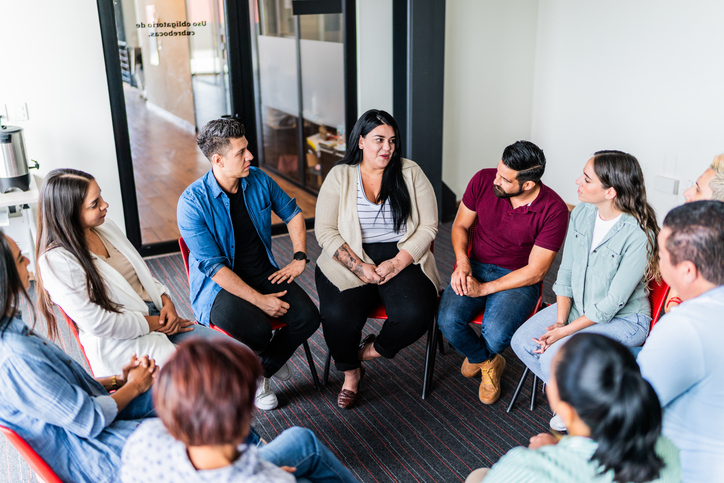Group therapy creates a unique therapeutic environment where people in recovery can both receive and provide support. This dual dynamic fosters healing in ways that extend beyond traditional one-on-one approaches.
These sessions provide a structured, safe space where participants can:
Group therapy delivers numerous benefits that extend beyond what individual therapy alone can provide. At New Life Recovery, we’ve structured our group sessions to maximize these advantages.
The supportive environment created in peer therapy allows participants to:
At New Life Recovery, our clients in group therapy find that they’re part of a community that truly understands their struggles.
Peer therapy also serves as a practical workshop for developing skills critical to long-term recovery.
These skills aren’t just theoretical – they’re practiced in real-time within the group setting. When one member shares a challenging situation they’re facing, the entire group benefits from working through potential solutions together.
The peer support component of group therapy creates a natural accountability structure that significantly improves recovery outcomes.
At New Life Recovery, we foster this accountability by:
The presence of a supportive group, where individuals are expected to participate, provides a powerful sense of accountability, which can be instrumental in maintaining commitment during moments of doubt.
At New Life Recovery, we’ve developed a distinctive approach to peer therapy that maximizes its effectiveness within our comprehensive treatment program.
Group therapy sessions are facilitated by licensed and credentialed professionals with specific expertise in SUD recovery and co-occurring disorders.
Unlike peer-led support groups – which have their own value – professional facilitation ensures that group dynamics remain therapeutic and that evidence-based practices guide each session.
Our therapists are experts at creating safe spaces while gently challenging participants to grow beyond their comfort zones.
Many individuals with SUDs have also experienced trauma, which must be addressed for complete healing to occur.
At New Life Recovery, our trauma-informed peer therapy:
What sets New Life Recovery’s group therapy approach apart is our integration of holistic practices that support overall wellness and natural dopamine production.
Our groups incorporate elements of:
There are various types of group therapies to address different aspects of the recovery journey. Each group has specific goals and approaches, allowing for a comprehensive healing experience.
The following describes some of the most common types of peer therapy:
These structured groups provide comprehensive education, exploring the interplay of brain chemistry and SUD, identifying personal triggers that contribute to substance use, and equipping participants with essential coping mechanisms.
By understanding the physiological and psychological aspects of SUD, participants gain a framework for their recovery journey.
Process groups offer a structured and supportive environment for emotional exploration, allowing individuals to examine underlying feelings and patterns. These facilitated groups can also promote interpersonal learning, fostering self-awareness and improved relationships.
In these sessions, participants:
These practical, skills-focused groups equip participants with concrete tools and actionable strategies for maintaining sobriety and enhancing overall quality of life by addressing specific challenges.
Some topics that are addressed in these groups include:
Skills development is designed to significantly reduce the chances of returning to SUD by giving participants practical tools for navigating challenges.
Recognizing that men and women often navigate distinct challenges throughout the recovery process, specialized peer therapy sessions are designed to address these gender-specific needs.
Gender-specific group therapy options allow for:
The experience of peer therapy changes throughout the recovery journey.
At New Life Recovery, we’ve observed distinct phases that participants typically move through, including:
and structured environment while simultaneously instilling hope for a brighter future through shared experiences.
During this phase, participants typically:
This early connection significantly improves treatment retention, with groups providing the support needed during the vulnerable initial stage of recovery.
As recovery progresses and individuals gain stability, they now have a safe space to practice newly acquired coping mechanisms and relational skills in a supportive, real-time setting.
Participants in this phase often:
This phase is critical for long-term recovery, as participants develop the concrete skills needed to maintain sobriety.
In advanced recovery, peer therapy often transforms into a space for mentorship and continued personal growth.
During this phase, participants frequently:
Continued engagement in peer support programs significantly reduces SUD rates by fostering a sense of community and shared responsibility where individuals both give and receive assistance.
While group therapy offers tremendous benefits, some individuals initially feel hesitant to participate.
For example, many new participants worry about confidentiality in group settings. We address this by:
When confidentiality is explicitly addressed and rigorously upheld within a group therapy setting, participation rates and comfort with personal disclosure significantly increase. This fosters a sense of trust that allows individuals to engage more fully in the therapeutic process.
Additionally, for individuals grappling with social anxiety, the prospect of participating in group therapy can initially appear overwhelming, triggering fears of judgment and discomfort in social settings.
We help participants overcome this by:
Even individuals with significant social anxiety will ultimately benefit from group therapy, often experiencing reduced anxiety symptoms overall.
Some individuals may question whether the generalized format of group therapy will adequately address their specific situation and individual needs, leading to concerns about its potential effectiveness.
We address this skepticism by:
We have found that when participants understand the evidence behind group therapy, engagement and outcomes improve.
Even during detoxification, modified group sessions provide critical support.
These early groups focus on:
During the immersive experience of residential treatment, group therapy sessions become significantly more intensive and comprehensive, encompassing a wider range of therapeutic modalities and addressing the multifaceted aspects of SUD and recovery through frequent, in-depth interactions.
Residential groups can include:
Intensive group experience during residential treatment creates strong foundations for ongoing recovery, with participants developing bonds that often continue throughout their recovery journey.
Our outpatient groups emphasize:
Continuing care groups provide ongoing support as clients fully reintegrate into their communities.
Ongoing participation in group therapy sessions can substantially improve long-term outcomes for individuals in recovery by fostering sustained sobriety and enhancing coping skills.
Beginning the group therapy journey requires courage, but the rewards are tremendous. At New Life Recovery, we make this first step as accessible as possible.
At New Life Recovery, we’ve witnessed countless transformations through the power of group therapy. While the journey begins with individual courage, it flourishes through connection.
Our comprehensive approach combines evidence-based therapeutic techniques with holistic practices, all within a supportive community setting.
The path to recovery isn’t meant to be walked alone. Through group therapy at New Life Recovery, you’ll find not only expert guidance but also companions for the journey – others who understand your challenges because they’ve faced them, too.
Our Fresno campus provides all levels of care in one location, creating a seamless recovery experience supported by credentialed professionals and a compassionate community.

